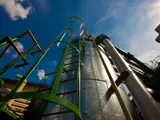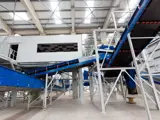The Recovery of Waste is an often-overlooked element of an economies’ ability to transition to a long-term sustainable state. All countries generate waste and the ability to fully process that resource in situ brings many benefits to local communities including:
- Economic Development: Waste recovery innovations create new business opportunities, jobs, and revenue streams through the sale of recovered materials and energy generation from waste-to-energy processes, benefiting both developed and developing economies. By adopting innovative waste recovery technologies, countries can help leapfrog traditional waste management methods, enabling them to build more sustainable and efficient systems from the outset. Waste recovery innovations enable the extraction and recycling of valuable materials, such as metals, plastics, and organic matter, contributing to a circular economy and reducing the need for virgin raw materials.
- Addressing Urbanisation: As urban populations continue to grow, especially in developing countries, innovations in waste recovery are crucial for managing the increasing volumes of waste generated in cities, preventing overburdened landfills and improving urban living conditions.
- Public Health: Poor waste management can lead to the spread of diseases and contamination of water sources. Innovations in waste recovery help ensure proper handling and treatment of waste, protecting public health, especially in developing countries with limited sanitation infrastructure.
We see the key factors driving Recovery (Waste) investment and resource allocation decisions over the next decades as including:
- Market Growth: The global waste recovery market is expected to experience rapid growth in the coming years, driven by factors such as population growth, industrialisation, increased awareness, and demand for recycled materials. The market is projected to grow from $57.69 billion in 2021 to $88.01 billion by 2030.
- Technology: Innovations in recycling technologies, such as advanced sorting and separation techniques, chemical recycling, and waste-to-energy solutions, are enabling more efficient and effective resource recovery from various waste streams, including plastics, metals, and organic waste.
- Informal Sector Integration: In many developing countries, there is a trend towards integrating informal waste pickers and recyclers into formal waste management systems, recognising their crucial role in resource recovery and providing them with better working conditions and long-term income.
- Policy and Regulatory Drivers: Governments and international organisations are implementing policies and regulations to promote resource recovery including extended producer responsibility schemes, landfill bans, and recycling targets, which are driving innovation and adoption in the waste recovery sector globally.



Projects
References:
- https://www.sciencedirect.com/science/article/abs/pii/S0959652622009349
- https://www.statista.com/statistics/239662/size-of-the-global-recycling-market/#:~:text=The%20global%20waste%20recycling%20services,environmental%20impacts%20of%20waste%20increases.
- https://www.sciencedirect.com/science/article/abs/pii/S0959652622009349
- https://www.sciencedirect.com/science/article/abs/pii/S0959652622009349


